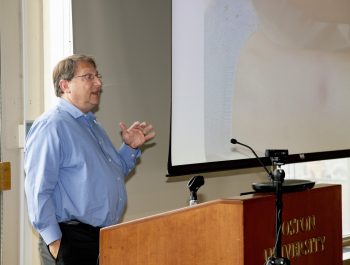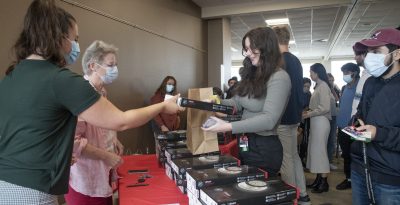Physicians Extol the Virtues of the Physical Exam at 5th Annual Lorraine Stanfield Lecture
Speaking to first-year medical students Monday morning at the 5th Annual Lorraine Stanfield, MD, Memorial Doctoring Lecture, keynote speaker Robert Lowe, MD, associate professor of gastroenterology, contemplated a future in which technology eclipsed the need for the stethoscope, the utilitarian symbol of doctoring since it’s invention in 1816 by the French physician, Rene Laennec.
“I can guarantee you that you will walk out with these tools, and someone will say to you, ‘Ugh, a stethoscope? Those will be obsolete in about five minutes,’” said Lowe. The annual event also includes distribution of the classic medical tools, purchased by alumni donors, to the students.
 Robert Lowe, MD, associate professor of medicine, was keynote speaker at Stanfield lecture and talked about the importance of the physical exam.
Robert Lowe, MD, associate professor of medicine, was keynote speaker at Stanfield lecture and talked about the importance of the physical exam.
Despite the proliferation of technological tools that can probe the human body beyond vision and touch, Lowe said the role of the physical exam – how a patient looks, behaves, what they say, how their body responds to touch, and what the relatively unsophisticated instruments like the stethoscope, a patella hammer for checking reflexes, the ophthalmoscope to peer into eyes, and the otoscope for looking into the ear canal tell the physician – still plays a vital role in making a diagnosis and deciding what steps to take.
“You are the main diagnostic tool,” Lowe said. “Your history-taking skills combined with your eyes, your ears, your senses, what you feel, how you examine people — that’s how you are going to start the process and it will lead you to the technology.”
Even a relatively simple tool like the stethoscope is more effective in the hands of someone who is attuned to the patient and what his or her senses detect.
“I’ll tell you a story about a man who comes into our emergency room,” Lowe said. “He’s a 52-year-old man with a history of high cholesterol, high blood pressure; he’s got a pain right here and you have to make sure he’s not having a heart attack.”
A lab test shows no enzymes indicative of heart issues, the EKG is normal, a chest x-ray also reveals no injury, Lowe continued. But the next morning, the man has a rash spread across the right upper torso.
“It was shingles, which your grandmother could diagnose when she sees the rash,” said Lowe. “There’s no other way to diagnose this but to look at it.”
Lorraine Stanfield was an assistant professor of medicine who taught at BUSM for more than 20 years and worked at Dorchester House, a community health center affiliated with Boston Medical Center, for 25 years. She succumbed to breast cancer at age 56, in 2017. Two years prior, in 2015, she received the Stanley L. Robbins Award for Excellence in Teaching, BUSM’s highest teaching honor.
 First year medical students attending the 5th Annual Lorraine Stanfield, MD Memorial Doctoring Lecture listen to Elizabeth Ferrenz, MD, assistant professor of Family Medicine, talk about Stanfield, a longtime faculty member who passed away in 2017.
First year medical students attending the 5th Annual Lorraine Stanfield, MD Memorial Doctoring Lecture listen to Elizabeth Ferrenz, MD, assistant professor of Family Medicine, talk about Stanfield, a longtime faculty member who passed away in 2017.
“During my time at the (Dorchester House) clinic, I constantly heard her name mentioned in conversation,” second-year medical student and Lorraine Stanfield Scholar Kendra Lujan told the students. “Sometimes while reviewing a note, I would come across one signed by Dr. Lorraine Stanfield. Even now, she continues to guide us all.”
“She never lost her wonder that we can make a diagnosis and learn so much from a physical exam,” said Kathryn Harris, MD, who worked alongside Stanfield at Dorchester House for 25 years.
Lowe said that even those who didn’t know, or who had never met, Stanfield were the beneficiaries of the knowledge passed down to her from her mentors … knowledge that she, in turn, imparted to colleagues and students, who in turn taught others.
 Following the Stanfield Lecture, students line up to receive medical instruments that were paid for by alumni donations.
Following the Stanfield Lecture, students line up to receive medical instruments that were paid for by alumni donations.
First-year student Avenelle Onaif paused from unboxing the new stethoscope she’d picked up following the lecture. Lowe had urged students to find a mentor and Onaif felt the alumni gift of medical instruments was emblematic of the supportive structure buoying new entrants.
“The beautiful thing about medicine is the passing down of tradition and the passing down of information,” said Onaif.
View all posts